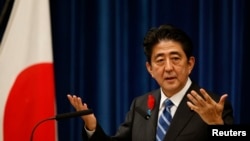WASHINGTON DC - Human Rights Watch is appealing to Japan’s prime minister, Shinzo Abe, to use a weekend visit to Cambodia to break a political deadlock and to push harder for human rights.
Opposition and ruling party officials remain at odds over election results from July, when the opposition says it lost the election to fraud and irregularities.
Its members have refused to join the new government or take place in legislative proceedings, rendering many decisions potentially unconstitutional.
“Japan’s leaders have too often engaged with rights-abusing governments without mentioning human rights,” Kanae Doi, Japan director at Human Rights Watch, said in a statement. “By pressing Hun Sen on the fundamentally flawed elections, Prime Minister Abe has a chance to show that Japan really means what it says when it comes to human rights and democracy.”
Abe will make a two-day visit to Cambodia this weekend, where he is expected to sign agreements on education and UN peacekeeping training, as well as health initiatives. Government officials say talks will not include the elections.
“Japan should raise the issue of justice, which many Cambodians have cried out for, especially in relation to the elections in July,” said Kuch Chanly, an independent political analyst based in Maryland. “Doing so will put Japan up to its reputation, as a lover of justice and an advocate for human rights.”
The opposition Cambodia National Rescue Party and the ruling Cambodian People’s Party remain at odds over the elections. Both sides have claimed victory in the polls, and the opposition says it wants a credible investigation into allegations of fraud and the exclusion of more than 1 million voters due to irregularities.
“Failure to speak out now would undermine the rights of millions of Cambodians to choose their own government, through free and fair elections,” Doi said.
Human Rights Watch said Japan should put more pressure on Cambodia’s leaders to ensure that development projects protect human rights.
Opposition and ruling party officials remain at odds over election results from July, when the opposition says it lost the election to fraud and irregularities.
Its members have refused to join the new government or take place in legislative proceedings, rendering many decisions potentially unconstitutional.
“Japan’s leaders have too often engaged with rights-abusing governments without mentioning human rights,” Kanae Doi, Japan director at Human Rights Watch, said in a statement. “By pressing Hun Sen on the fundamentally flawed elections, Prime Minister Abe has a chance to show that Japan really means what it says when it comes to human rights and democracy.”
Abe will make a two-day visit to Cambodia this weekend, where he is expected to sign agreements on education and UN peacekeeping training, as well as health initiatives. Government officials say talks will not include the elections.
“Japan should raise the issue of justice, which many Cambodians have cried out for, especially in relation to the elections in July,” said Kuch Chanly, an independent political analyst based in Maryland. “Doing so will put Japan up to its reputation, as a lover of justice and an advocate for human rights.”
The opposition Cambodia National Rescue Party and the ruling Cambodian People’s Party remain at odds over the elections. Both sides have claimed victory in the polls, and the opposition says it wants a credible investigation into allegations of fraud and the exclusion of more than 1 million voters due to irregularities.
“Failure to speak out now would undermine the rights of millions of Cambodians to choose their own government, through free and fair elections,” Doi said.
Human Rights Watch said Japan should put more pressure on Cambodia’s leaders to ensure that development projects protect human rights.







